Scapula
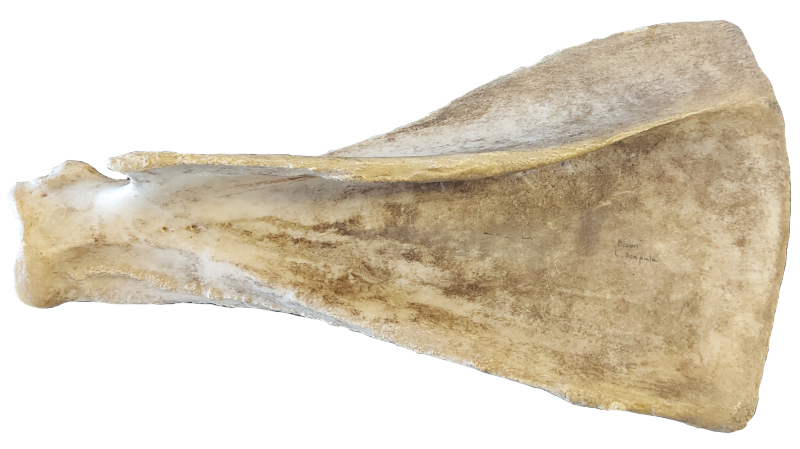
The proximal end of the scapula is considered the articular surface.
For the Fincastle Project, Bone Units 29 and 31 (previously undefined in the 1991 edition) and 35-37 were added.
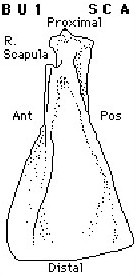
BU 1
SC A
Complete element.
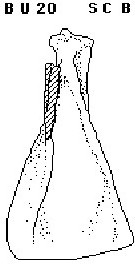
BU 20
SC B
Scapula missing all of spine including acromion. Rest of element present. (EMA)
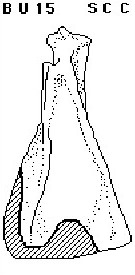
BU 15
SC C
Element complete except for a small to moderate sized portions of flat, thin blade removed. Spine of scapula intact. Posterior and anterior margins completely or largely intact.
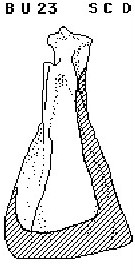
BU 23
SC D
Intact proximal end of scapula including acromion plus all or most of base of spine. Similar to BU 7. Anterior and posterior border missing. Crest of spine may or may not be absent. (KK)
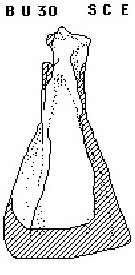
BU 30
SC E
Consists of major portion of proximal 1/2 – 2/3 of element. Glenoid cavity complete but adjoining tuber scapulae absent. All of distal margin and distal portions of anterior and posterior margins removed. Spine usually intact except for distal portion and acromion which is always absent. Same as BU 7 except tuber scapulae missing. (GL)
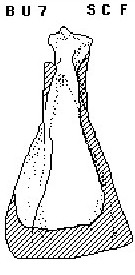
BU 7
SC F
Consists of proximal 1/2 – 2/3 of entire element. All of distal margin and distal portions of anterior and posterior margins removed. Spine usually intact except for distal portion and acromion which is always absent. Glenoid always present and intact. Same as BU 30 except tuber scapulae present.
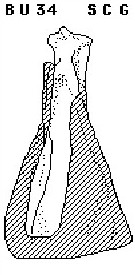
BU 34
SC G
Consists of complete proximal end, neck and most or all of base of spine. Acromion always absent. Remaining crest of spine may or may not be present. All of distal, anterior and posterior margins of blade removed. Similar to BU 7 and 30. (MB)
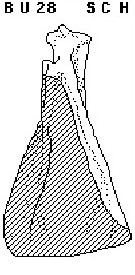
BU 28
SC H
Consists of intact proximal end of scapula, including the acromion and up to 1/2 of the spine. The adjoining posterior border is present. The anterior border is totally absent. Crest of spine may or may not be present. (WU)
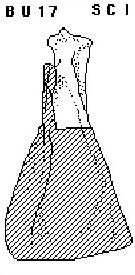
BU 17
SC I
Consists of proximal 1/3 of element. All spine and most of blade removed. Glenoid cavity, tuber scapulae and coronoid process intact. Acromion absent.
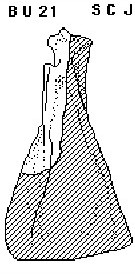
BU 21
SC J
Medium to large fragment consisting of anterior 1/2 – 1/3 of glenoid cavity and an adjoining section of the flat blade including anterior margin. All of spine including acromion present. Similar to BU 25 but with acromion. (KK)
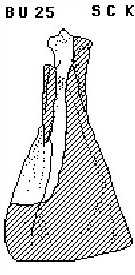
BU 25
SC K
Medium to large fragment consisting of anterior 1/2 – 1/3 of glenoid cavity and an adjoining section of the flat blade including anterior margin. Acromion and all or most of the spine missing. Similar to BU 21. (KK)
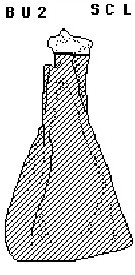
BU 2
SC L
Complete glenoid cavity and tube. Scapulae severed from rest of element.
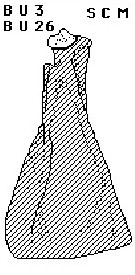
BU 3
SC M
Anterior half of glenoid cavity and all of tuber scapulae (anterior half of BU 2). 10 cm or less of area adjacent to glenoid cavity represented. BU 26 was also assigned to this element configuration. Either BU number can be used in coding. (JB)
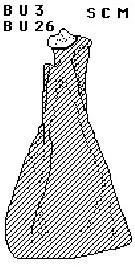
BU 26
SC M
Anterior half of glenoid cavity and all of tuber scapulae (anterior half of BU 2). 10 cm or less of area adjacent to glenoid cavity represented. BU 26 was also assigned to this element configuration. Either BU number can be used in coding. (JB)
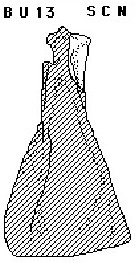
BU 13
SC N
Posterior 1/2 of glenoid cavity and 10 cm or more of area adjacent to posterior edge. Similar to BU 4.
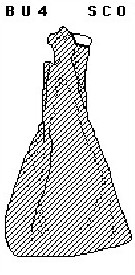
BU 4
SC O
Posterior half of glenoid cavity (posterior half of BU 2). Similar to BU 13.
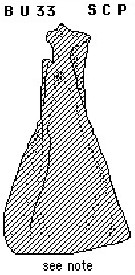
BU 33
SC P
Medial half of glenoid cavity and neck of scapula. Not visible in illustrated view. (GL)
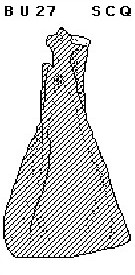
BU 27
SC Q
Fragment of glenoid cavity without tuber scapulae. No more than 1/3 represented from various areas of glenoid cavity except at tuber scapulae. From 0-10 cm of area adjacent (distal) to glenoid cavity represented.
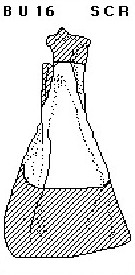
BU 16
SC R
Middle portion of scapula of proximal 1/2 – 3/4 of base of spine and all or most of adjacent anterior and posterior borders intact. Entire glenoid cavity, tuber scapulae, acromion, distal border absent. All or most of crest of spine absent.
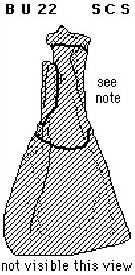
BU 22
SC S
Ventral portion of flat blade near proximal end identifiable by groove between tuber scapulae and glenoid cavity. Portion of anterior and posterior margins may be present. None of glenoid fossa present. Please note: the bold lines in the drawing indicate the area of BU which is on the reverse (ventral) face of the element. The one presented in the drawing is the dorsal view. (KK)
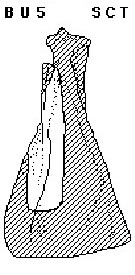
BU 5
SC T
Major portion or the entire spine of scapula. Entire posterior border always absent, but anterior border usually intact near proximal end. Acromion always absent. Remainder of crest of acromion usually all present.
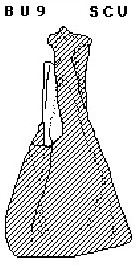
BU 9
SC U
Proximal portion of crest of spine including the acromion.
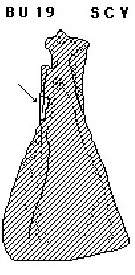
BU 19
SC V
Small fragment of spine of scapula characterized by sinuous cross section. None of the acromion and none of base of spine with “T” shaped cross section represented. (JB)
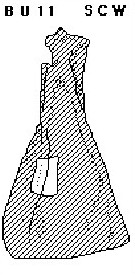
BU 11
SC W
Short portion of spine of scapula usually characterized by “T” cross-sectional shape (rest of spine and anterior margin may or may not be intact). Posterior margin usually absent.

BU 12
SC X
Not actually a butchering unit. Frequency indicates number of pieces constituting BU 11. Not coded for Oldman project.
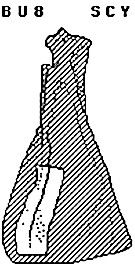
BU 8
SC Y
Medium to large fragment of flat blade of scapula with fractured base of spine forming anterior edge. Posterior border may be, but not usually present.
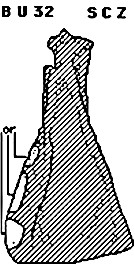
BU 32
SC Z
Fragment(s) of anterior border – may or may not include parts of spine or base of spine. (GL)
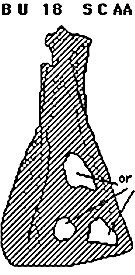
BU 18
SC AA
Fragment of flat blade of scapula with no margins present. Identifiable by distinctive thin cross-section and flat surface. Frequency indicates number of pieces only. Defined Nov.24/86.
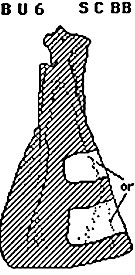
BU 6
SC BB
Moderate sized portion of flat blade of scapula identifiable by the presence of a portion of the posterior border. Similar to BU 14.
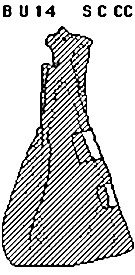
BU 14
SC CC
Fragment of posterior border characterized by distinctively shaped cross-section. None of glenoid fossa present. Frequency indicates number of pieces only. Similar to BU 6 except very little to none of flat blade portion of the scapula attached.
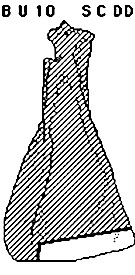
BU 10
SC DD
Thin fragment of blade of scapula from distal end as evidenced by all or portion of distal cartilaginous surface. Frequency indicates number of pieces and not number of elements.

BU 24
SC EE
Undefined

BU 29
SC FF
Split down center separating the ventral from dorsal face. (SB)
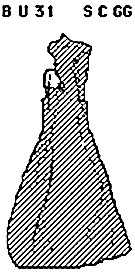
BU 31
SC GG
Acromion of spine only. (SB)
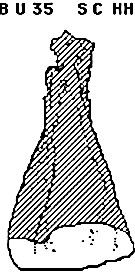
BU 35
SC HH
Complete proximal end present with only a small portion of blade present. Similar to BU 15. (SB)
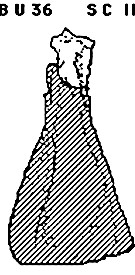
BU 36
SC II
Fragment with the entire glenoid cavity and some of spine. (SB)
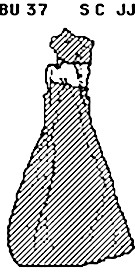
BU 37
SC JJ
Small fragment in the neck section. (SB)